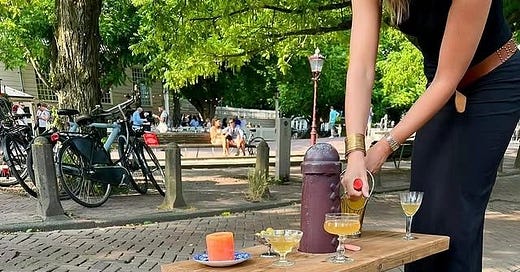#24: AI For Activists, Bollards With Beverages, and Sidewalks Strain Stilettos
Welcome to the 24th issue of Urbanism Now, our weekly newsletter curated with brief and insightful urban ideas from around the world to inspire action where you (c)are.
This newsletter is curated by Maria Paula Moreno Vivas and Ray Berger. Learn more on our About page.
Thank you for your interest and support. If you find this newsletter useful, please forward it to a friend!
Let's get started:
Berkeley, the city that pioneered single-family zoning as an exclusionary tool in the early 20th century, has reversed course with a "Middle Housing" ordinance allowing up to eight units on residential lots.
Surveillance tools like facial recognition are often used as tools for oppression, but as civil unrest flared in Los Angeles and police officers hid their badge numbers, one activist flipped the script by using facial recognition to identify the oppressors.
In other urban AI wins, LA is also using AI to identify and report vehicles blocking bus lanes, and Helsinki wants to use AI on scooter sensor data to detect infrastructural and behavioral problems.
Amsterdam residents created the Amsterbarretje, a clever device that transforms the city's iconic bollards into pop-up cafe tables, allowing people to enjoy food and drinks with canal views while meeting friends.
"Can Cities Keep Up With High Heels?" examines how urban infrastructure fails women who wear heels, highlighting Seoul's project to repave streets with heel-friendly materials and questioning whose bodies cities are designed for.
Videos, podcasts, books, and socials:
A new book, "Introduction to GIS Programming: A Practical Python Guide to Open Source Geospatial Tools," offers a hands-on guide to spatial analysis and interactive mapping using Python. The book includes code examples and 26 hours of video tutorials; the PDF version is available for $25 until July 4.
A 13-minute video-essay by Cities by Diane laments late-night businesses hurt by the pandemic and online shopping. As a night owl myself, I (Ray) resonate deeply with the video’s longing for evening spaces that don’t require drinking alcohol.
Jonathan Tarleton discusses his new book "Homes for Living: The Fight for Social Housing and a New American Commons", which details the dramatic battle within Brooklyn and Manhattan social housing co-ops as residents grapple with life-changing decisions: preserve affordable housing for future generations or cash out for massive personal profit.
Jobs:
Results for America's What Works Cities initiative seeks an associate director, curriculum design & management, to develop learning programs helping city governments use data and evidence for better resident outcomes. $114k - $147k salary.
The Open Society Foundations is offering a Leadership in Government Fellowship to support former senior U.S. government officials who advanced social change, allowing them to reflect and contribute expertise to public dialogue. $115k - $160k salary. Apply by July 24.
The Urban Studies Foundation is recruiting new Trustees to serve on its Board, with start dates throughout 2026. Trustees may be based anywhere worldwide, the position is unremunerated but covers reasonable expenses. August 8.
Defacto Urbanism is hiring a junior urban/landscape designer and an intern in urbanism or landscape architecture to work on projects addressing climate change, circularity, green cities and water management in Rotterdam.
Events and deadlines:
All Things Urban is accepting applications for Career Compass, a 6-week online course helping urban professionals find their next career move. Apply by July 11.
The Urban Studies Foundation offers fully-funded 3-9-month sabbatical research fellowships for urban scholars from the Global South. Apply by July 16.
UCL Urban Lab celebrates 20 years with "Doing Otherwise," bringing together feminist scholars to explore how critical urban research navigates power, positionality, and activist spaces in contested cities. July 22.
Yale is accepting applications for the Emerging Climate Leaders Fellowship, a five-month program for 16 young climate and clean energy practitioners from the Global South to develop technical skills and professional networks. August 1.
A five-day program in Barcelona will explore how the city uses art and culture for urban regeneration and public space development, featuring site visits and discussions for urban professionals. Sept. 21-26. (Submitted by Meg)
EIT Urban Mobility offers a free online course on Superblocks, available until December 2025, teaching how this Barcelona-born strategy transforms cities by prioritizing people over cars.
A five-day leadership program in Amsterdam teaches community engagement strategies to navigate resistance and implement changes like cycling infrastructure and public space reclamation, using real-world case studies and practice on city streets. April 20 - 24, 2026.
What did you love? What did we miss? Let us know in the comments below.
As always, please share with a friend!
Amsterbarretje. Source: Amsterbarretje





